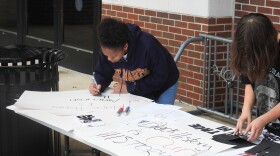A University of Tennessee Martin professor has apologized for writing a letter containing 'descriptions of mass violence on campus.'In a university release Friday night, Chancellor Keith Carver said a letter written by English professor Charles Bradshaw under the pen name 'Wesley Sniper' was crafted as an example of satire. According to the release, it was meant for Bradshaw's class, but had been distributed to a wider audience. Individuals who saw the letter notified the police.
UTM Department of Public Safety determined the campus was not in danger. Bradshaw was placed on paid administrative leave during an investigation. The campus reported the incident to the Weakley County District Attorney who declined to press charges because Bradshaw's speech is protected by the First Amendment.
Carver said "the subject of mass violence was not the best example to use even for satire" considering recent national events, including the mass shooting in Las Vegas, of which UTM alum Sonny Melton was a victim. Carver said he acknowledges Bradshaw's right to engage in satire and appreciated his written apology, included below:
--
An Open Letter from Dr. Charles Bradshaw
I would like to apologize for the problems created by a letter many have seen and responded to that I wrote satirizing S.R. 1704, “A Resolution to Allow Students to Concealed Carry on Campus.”
The letter was written as an example of satire to be used in a class examining different types of written argument and to prove its usefulness to current events. I informed the class that an anonymous faculty member had written it, but it was in no way presented as embodying any political views or actual views that I or any real person held. Nor did I suggest or imply that students should hold a particular view of the “Conceal-and- Carry” situation.
I anticipated that laughter, not fear, would be its effect in my class and among my colleagues, and I shared several copies, anonymously, with selected members of my department. When I found out that campus police were inquiring about the letter, I immediately contacted them to let them know I was the author.
I am sorry, given current events, for any fear or anger this has caused for students or any others who support the university. I have the utmost respect for the people I work with on campus and for state government officials and would never wish to scare or harm them. The university has been an extremely peaceful place for me over the years, and I took that security for granted in constructing this letter. I meant neither violence nor harm to any individual or entity mentioned or implied.
Most of all, I owe UTM’s Student Government Association an explanation. I hold UTM students in the highest regard and reverence their agency in student governance and their freedom to make their own decisions. As a professor, I go to great lengths to empower my students to be independent and responsible thinkers, so it hurts and embarrasses me personally and professionally to think that I have curtailed these values in any way or belittled any student. I applaud the initiative taken by the students who fostered this resolution and sought to responsibly debate in a transparent manner with their colleagues. I am truly sorry if this letter made light of the legislative process or disrespected their bravery in bringing forward such an important consideration. This is the very heart and soul of higher education, and I honor their efforts.
I also want to apologize to the other entities and officials of the university that have been involved in this misunderstanding. They have been thorough and quick to respond to every concern, always with the campus’s safety at the forefront of their minds.
Respectfully,
Charles Bradshaw




